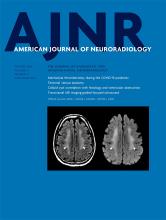Abstract
BACKGROUND AND PURPOSE: Acute ischemic stroke due to tandem occlusive lesions involves high-grade ICA stenosis or occlusion with a distal intracranial occlusion. Several approaches and devices exist in the treatment of tandem occlusions; however, a consensus on the optimal technique does not exist. The Dotter technique is a method of catheter-based angioplasty to recanalize cervical ICA occlusions. We present a modified dilator-Dotter technique, which involves a polyethylene, tapered inner dilator to initially cross the occlusion, followed by guide catheterization and subsequent intracranial thrombectomy. The purpose of this study was to examine the safety and efficacy of this dilator-Dotter technique.
MATERIALS AND METHODS: We performed a retrospective review of patients with acute stroke due to tandem ICA intracranial occlusions, treated with our dilator-Dotter technique and thrombectomy between June 2018 and December 2019. We examined clinical, radiographic, and procedural data, as well as complications and outcomes.
RESULTS: Thirty-two patients were included. In 100% of cases, the dilator-Dotter technique resulted in ICA recanalization allowing successful thrombectomy. TICI 2b-3 revascularization was obtained in 31 patients (96%), within an average time of 25 minutes. The average preprocedural ICA stenosis was 98%, including 23 patients (72%) with complete occlusion. Following the dilator-Dotter technique, average ICA stenosis improved to 59%. There were no instances of death, iatrogenic dissection, emboli to new territory, or symptomatic intracranial hemorrhage.
CONCLUSIONS: The dilator-Dotter technique may be a safe and effective modification of the traditional Dotter technique in allowing rapid ICA recanalization in cases of acute ischemic stroke due to tandem occlusions.
ABBREVIATIONS:
- ADAPT
- direct aspiration first-pass technique
- AIS
- acute ischemic stroke
- ICH
- intracranial hemorrhage
- LVO
- large-vessel occlusion
- sICH
- symptomatic intracranial hemorrhage
- © 2020 by American Journal of Neuroradiology












